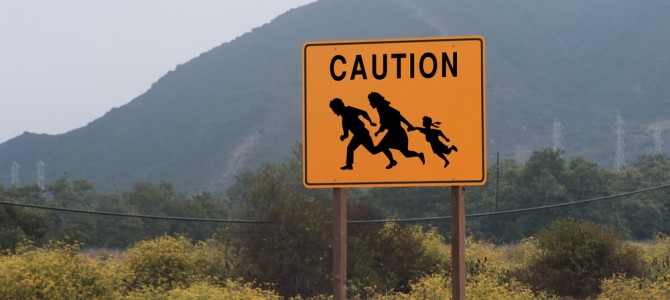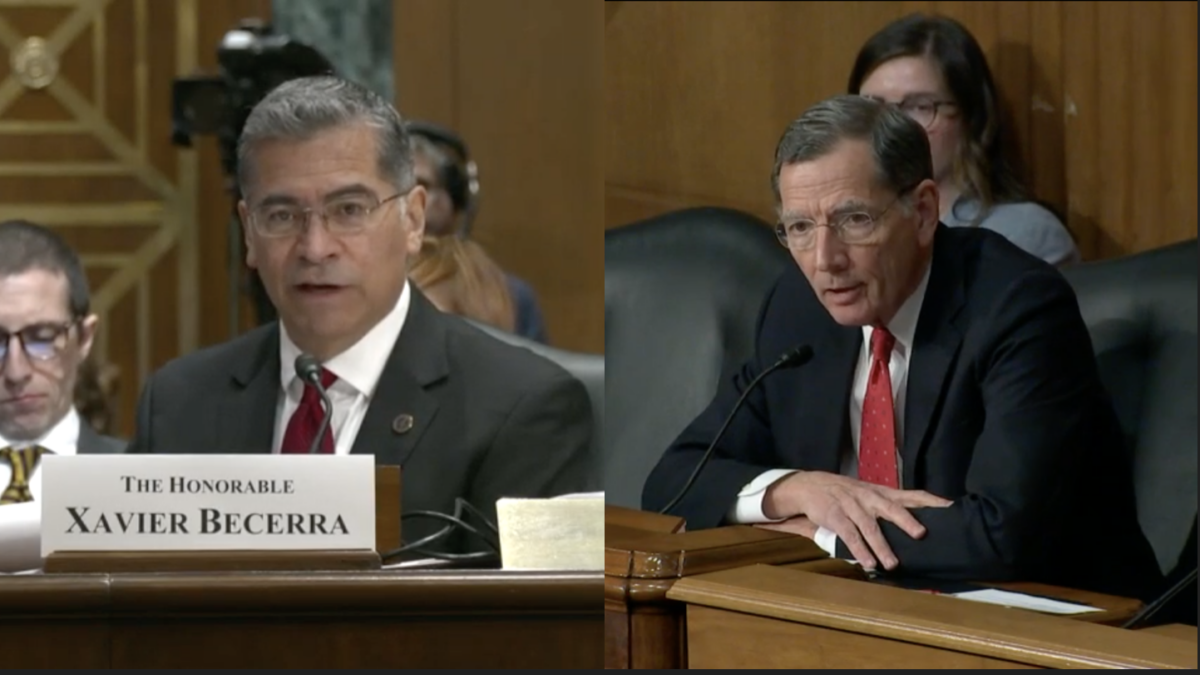
The overlords of political correctness have struck again. Evidently, it’s now a “hateful slur” to call the children of illegal immigrants “anchor babies,” a long-held designation to describe how automatic citizenship bestowed on the children of illegal immigrants becomes a powerful magnet for people entering and staying in the United States illegally.
Last week, Hillary Clinton attacked Jeb Bush for using the term, saying it’s offensive and that anchor babies are simply “babies.” Donald Trump scoffed at that and refused to give in to the easily offended speech police. Louisiana Gov. Bobby Jindal had the best response, tying Clinton’s comment to the abortion industry’s harvesting of organs from aborted babies.
“You know what I find offensive is Hillary Clinton, the Left, when you look at those Planned Parenthood videos—they refuse to call them babies, they call it fetal tissue, they call them specimens,” Jindal said. “That’s what’s offensive.”
After the Center of Medical Progress released the videos, defenders of abortion came out swinging, saying they aren’t “babies” but “products of conception“—a nice, clean, politically correct term that dehumanizes unborn children so the consciences of abortionists can be dulled as they chop up and crush the arms, legs, bodies, and heads of human babies.
Let’s Call Them Products of Deception
So, here’s a suggestion—for the sake of consistency among those on the Left. Let’s start calling anchor babies “products of deception,” because that’s exactly what they are—they’re children used by their parents to deceive American citizens in order to abuse and take advantage of our generosity.
Illegal immigrants, and even tourists who come to the United States for the fraudulent purpose of delivering their children on American soil, use their babies as tools to remain in our country and often to get freebies from our welfare system and to bring in more family members through chain migration. They do this despite the Fourteenth Amendment offering no legal support for this practice and no court in American history ever holding that the children of illegal immigrants have the right to automatic citizenship. Yet, somehow, this practice has administratively slipped into our system. Now, illegal aliens are taking advantage of it in droves.
Note that the emphasis here is on illegal aliens—a point often lost in the debate over birthright citizenship. When advocates for immigration reform say the United States must end “birthright citizenship,” they are talking about citizenship for the children of illegal immigrants and those committing fraud on the American system, not for children of legal immigrants, and certainly not for people who have already been granted citizenship (see the grandfather clause in the Birthright Citizenship bill HR 140). They are talking about the practice of giving automatic citizenship to the children of illegal immigrants who are not subject to the jurisdiction of the United States but are citizens of another country.
“Anchor babies” is a descriptor of how people who are subject to the authority of another country are using their children as tools to stay in the United States despite having no legal status to do so. This is not a term we use in everyday conversation when we personally interact with people, any more than we use other designations that could be offensive out of context. We don’t walk up to a parent with an obese child, for instance, and say, “What a wonderful little obese child you have.” Yet we use the term “obese children” in dialogue about healthcare and nutrition all the time; it’s part of public, not personal, discourse. Context matters.
The same is true of “anchor.” It is a descriptor—and an accurate one. Parents who come here illegally, or parents who visit for the sole purpose of having their child on U.S. soil (totaling nearly 36,000 per year), are using their children as anchors to set up house in the United States. The term describes an ugly reality. It’s not meant to judge the character or value of the children themselves, but only to describe their role in illegal immigration practices.
An Anchor-Baby Agenda Is Harmful
The number of anchor babies in America is larger than many realize. According to Jon Feere, legal policy analyst for the Center for Immigration Studies, “as many as one out of 10 births in the United States is now to an illegal immigrant mother.”
Yet, despite the illegal status of the parent, the executive branch automatically recognizes these children as U.S. citizens, giving them Social Security numbers and U.S. passports, Feere told the Subcommittee on Immigration and Border Security in a hearing on birthright citizenship legislation.
It is unlikely that Congress, which has complete power in this matter, intended such a broad application of the Fourteenth Amendment’s Citizenship Clause, and the Supreme Court has never held that illegal citizens must be considered U.S. citizens at birth. The Court has only made such a decision for children born to citizens or permanently domiciled immigrants (see United States v. Wong Kim Ark, which was about legal immigrants but has been repeatedly and wrongfully applied to include illegal aliens).
It is unclear how long the U.S. government has been following the practice of universal, automatic birthright citizenship without regard to the duration or legality of the mother being present in the United States, Feere told the subcommittee, but it’s an important issue that needs to be addressed because mass illegal immigration is on the rise.
“The population of U.S.-born children with illegal alien parents has expanded rapidly in recent years from 2.7 million in 2003 to 4.5 million by 2010,” Feere says. “Under the immigration enforcement priorities of the Obama administration, illegal immigrants who give birth to U.S. citizens have become low priorities for deportation; furthermore, under the president’s DAPA program (the Deferred Action for Parents of Americans and Lawful Permanent Residents program)—a program currently held up in court—would provide benefits to illegal immigrants who gave birth here and allow them to ‘stay in the U.S. without fear of deportation.’ The broad interpretation of the Citizenship Clause forms the basis for these policies.”
The Problem of Chain Migration and Welfare
Birthright citizenship of children to illegal aliens sets off chain migration. When a child born to illegal immigrants turns 18, he can sponsor an overseas spouse and unmarried children of his own. At the age of 21, he can also sponsor his parents and any siblings.
“Family-sponsored immigration accounts for most of the nation’s growth in immigration levels,” Feere says. Approximately two-thirds of our immigration flow comes from chain migration and is increasing because of the growing migration chains that operate independent of our nation’s labor needs.
Other countries that recognize birthright citizenship curb this problem by not allowing the child to initiate chain migration and thereby avoid some of the problems associated with birthright citizenship that the United States experiences.
One of those problems is access to taxpayer-subsidized benefits. Most welfare benefits are not accessible to illegal immigrants, Feere explains, but they can obtain benefits, such as Medicaid and food stamps, on behalf of their children, who are U.S. citizens.
“Many of the welfare costs associated with illegal immigration are due to the executive branch’s current interpretation of the Citizenship Clause,” Feere told the subcommittee. “Currently, 71 percent of illegal-alien headed households with children make use of at least one major welfare program.” That number jumps to 79 percent in illegal households from Mexico. By comparison, only 38.7 percent of households headed by U.S. citizens use at least one major welfare program.
Illegal immigrants from Mexico benefit greatly from our policy of birthright citizenship, yet their own country shuns any such practice. While Mexico grants automatic nationality to anyone born in Mexico, they do not give automatic citizenship. “This is true even of children born to Mexican citizens,” Feere says. “When a Mexican reaches the age of 18, they then acquire citizenship.”
When it comes to granting nationality or citizenship to children born to illegal immigrants, it’s not even much of an issue because of Mexico’s strict immigration laws. According to the Mexican Constitution, the government can expel any immigrant for any reason without due process. Their property rights are severely limited, and immigrants have to get permission from the government to own land. “Even if permission is granted, the immigrant can never own land within 100 kilometers of land borders nor land within 50 kilometers of the coasts.” Clearly, in Mexico, immigrants are treated as second-class citizens, yet we hear no outcry over their immigration policy.
The Lack of Assimilation
The anchor-baby agenda in the United States is fraught with deception and fraud. This is particularly evident when it comes to assimilation, which is important because people need to think of themselves as Americans to maintain America’s social fabric. This broad interpretation of our nation’s birthright citizenship clause, however, threatens our social cohesion.
Feere expanded on this point when describing the additional problem of “birth tourists” and their use of the anchor-baby agenda to game the system through fraud. In his testimony before the subcommittee, he told the following story to that clearly reflects how this disturbing trend negatively affects our society:
Meet Jennifer Shih, a UC Davis college student born in New York who tells the Sacramento Bee, ‘I’m Taiwanese more than American.’ Back in 1989, Shih’s mother boarded a jet bound for New York, tourist visa in hand. She didn’t arrange her travel in order to take a Broadway show, however; she was eight months pregnant and the goal was to add a U.S.-passport holder to her family. In other words, she was engaging in fraud as admitted by Mr. Shih, who cited the quality of American schools as the impetus. Two months after giving birth Mrs. Shih ‘returned to Taiwan with her U.S. passport–bearing daughter in tow.’
In 2004, when Jennifer reached the age of 15, she returned to the United States to take advantage of U.S.-taxpayer subsidized high schools in Idaho, Utah, and college in California. Understandably, Jennifer—who didn’t speak English when she arrived—describes the United States as a ‘foreign country.’ The reporter who interviewed her notes that ‘even after eight years,’ Jennifer says she still ‘thinks about Taiwan every day’ and visits nearly every year. Jennifer’s honesty highlights the absurdity of a lax birthright citizenship policy and raises significant questions of allegiance and assimilation.
Jennifer’s father has since moved to the United States, presumably as a result of chain migration, which allows individuals to sponsor parents and siblings upon turning 21 years of age. Jennifer says she is interested in having kids of her own who will go to college in America. This is a perfect example of how one instance of fraud from a temporary alien can result in a permanency that was never welcomed by the American public. Birth tourism effectively puts U.S. citizenship policy into the hands of foreigners.
“Despite the fact that no one in Jennifer’s family has been paying taxes to support the University of California systems,” Feere continues, “she will be treated like every other California student whose parents have been subsidizing the system for decades.” Because of her mother’s fraud and deception, Jennifer won’t have to pay the higher tuition rate she would have paid as a foreign student. In addition, every social welfare program available to Americans will be available to Jennifer and her father.
Another issue to consider in light of this story is the safety of the American public. When we apply Jennifer’s story to radical Islamists, we see how easily it would be for our enemies to walk among us, not only gaining access but benefiting from our educational system and social welfare programs. What right-minded nation acts in such a self-destructive manner?
The practice of birthright citizenship for illegal aliens and anyone perpetrating fraud on the United States needs to end, not because we’re a bunch of racists who are afraid of strangers, but because we care about the safety and stability of our home and expect those who want to become a part of our society to respect the laws that make our nation great. The anchor-baby agenda does not add to the greatness of America. It unravels it. It’s based, not on fairness or justice, but on deception and sometimes outright fraud.
When criticized for using the term “anchor baby,” both Trump and Bush asked reporters what we should call should children of illegal immigrants, if not anchor babies. Given the deception surrounding the practice of birthright citizenship for these children—starting with the sham that it’s part of the Constitution itself and it’ll take a constitutional amendment to change it—the term “products of deception” seems like the perfect designation.








